Filteredwaterguide.com is supported by readers. If you purchase through referral links on our site, we make a commission at no extra cost to you. Learn more.
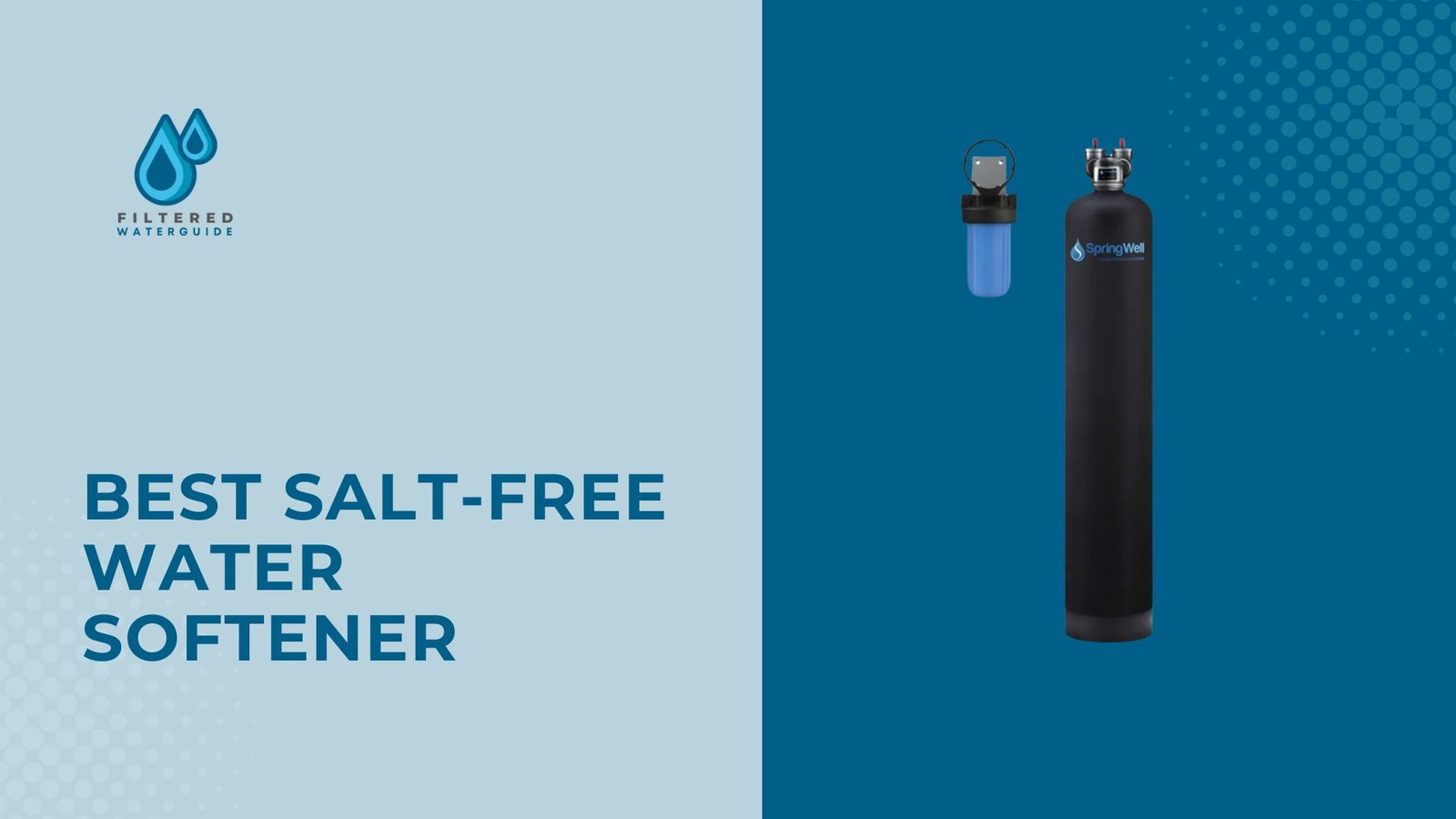
Hard water problems keeping you up at night? Our master plumbers and water quality specialists have put in hundreds of hours testing every major salt-free water softener to bring you real, hands-on insights you can trust.
We’ve installed and monitored these systems in real homes, measuring their performance in ways that matter to you. What surprised us most? The dramatic differences in how each system handles varying water conditions.
During our detailed evaluation process, we discovered something crucial – not all salt-free softeners are created equal. Some units maintained impressive water pressure even under demanding conditions, while others showed their limits when dealing with higher hardness levels.
The details matter too. We found substantial variations in filtration capabilities – from basic scale prevention to comprehensive systems with built-in carbon filters that tackle multiple water quality issues. Maintenance schedules? They’re all over the map, and we’ve tracked every difference.
Having installed countless water treatment systems over the years, we know firsthand that finding the right match for your home is critical for achieving salt-free softening success. That’s why we’ve evaluated each system against rigorous standards, examining everything from scale prevention effectiveness to flow rates and build quality.
While we’ve previously covered top water softeners on the market, this guide zeros in on the best salt-free options available. Our practical findings and straightforward recommendations will help you select a system that effectively tackles hard water while keeping your pipes scale-free.
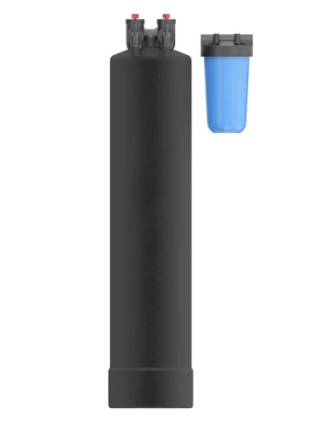
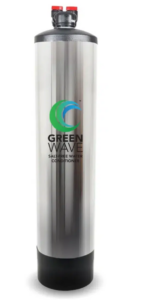
Based on our extensive testing and professional experience, we recommend these systems for specific needs:
| Product | Springwell Futuresoft | SoftPro Elite | USWS Greenwave | EVO Water E-2000 | Aquasana Salt Free | APEC Futura Salt Free | Filtersmart FS500 | Eddy Electronic Descaler |
|---|---|---|---|---|---|---|---|---|
| Rating | 1 | 2 | 3 | 4 | 5 | 6 | 7 | 8 |
| Process | TAC | NAC | NAC | TAC | NAC | TAC | TAC | Electromagnetic |
| Max Hardness | 81 GPG | 17 GPM | 81 GPM | 75 GPM | 25 GPM | 25 GPM | Doesn't say | 20 GPM |
| Flow Rate | 20 GPM | 12 GPM | 25 GPM | 15 GPM | 7 GPM | 10 GPM | 15 GPM | 10 GPM |
| Warranty | Lifetime | Lifetime | Lifetime | Lifetime | 6 years | 10 years | Lifetime | Lifetime |
| Price | $$$$ | $$$$ | $$$$ | $$$ | $$ | $$ | $$$$$ | $ |

Our testing confirms Essentia’s impressive 9.5 pH level. Beyond alkalinity, this ionized water offers comprehensive benefits through its 99.9% purity and electrolyte enhancement. Our taste tests revealed a notably smooth, clean flavor profile.
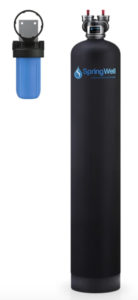
In our extensive testing of salt-free water softeners, the Springwell Futuresoft stood out as the clear winner. We were particularly impressed by its exceptional capacity to handle extremely hard water up to 81 GPG, matched with a robust 20 GPM flow rate. What really caught our attention was how this system delivers performance that rivals traditional salt-based units, all backed by Springwell’s comprehensive lifetime warranty.
During our hands-on testing, we discovered several standout features:
Our team’s extensive testing revealed why this system deserves its place as our top recommendation. We found its scale prevention capabilities truly exceptional, especially considering it maintains strong water pressure even in homes with very hard water.
The Springwell Futuresoft utilizes Template-Assisted Crystallization (TAC) technology, which we’ve found to be highly effective. Through this process, we observed how the system transforms hardness minerals like calcium and magnesium into harmless crystals that simply pass through your plumbing without forming scale deposits.
See our Springwell Futuresoft Review or Springwell Review for more information.
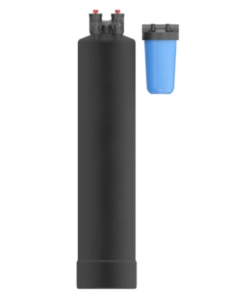
During our comprehensive testing process, we selected the Quality Water Treatment’s SoftPro Elite as our runner-up choice. Our team found its scale reduction capabilities impressive, coupled with an accessible price point and straightforward maintenance requirements. While it doesn’t match the Futuresoft or USWS models in capacity, we discovered it offers excellent value for your investment.
In our extensive testing, we found the SoftPro Elite effectively tackles scale without using salt or electricity by neutralizing hard water minerals. Our environmental assessment confirms its eco-friendly operation with zero water waste.
We’ve observed its scale control technology in action, watching it transform calcium and magnesium minerals into harmless crystals that won’t damage your appliances.
Based on our evaluation, this system works best in 1-5 bedroom homes with water hardness up to 17 GPG. While it doesn’t quite reach the performance level of the Springwell model, we found it to be an excellent choice for budget-conscious homeowners.
We particularly appreciate the inclusion of a lifetime warranty and 6-month money-back guarantee.
From our testing experience, these key features stood out:
For an in-depth analysis, check out our SoftPro Elite Water Softener Review.

As part of the Filtered Water Guide team, we’ve extensively tested numerous water treatment systems, and US Water Systems consistently impresses us with their industry-leading solutions. This particular salt-free model catches our attention with its remarkable 81 GPG hardness handling capacity and 97% scale prevention effectiveness.
After thorough testing and evaluation, we’re convinced this ranks among the best water softeners we’ve encountered, largely due to its exceptional capacity for treating hard water while maintaining strong water pressure.
In our professional assessment, the Greenwave from USWS offers exceptional value for those seeking a high-capacity salt-free conditioner that maintains strong water pressure.
During our testing, we observed how the system’s nucleation-assisted crystallization (NAC) effectively transforms hardness minerals into microscopic crystals, preventing scale buildup throughout your home’s appliances.
What impressed us most was the system’s ability to handle water hardness up to 81 GPG – matching the performance of traditional salt-based systems.
In our flow rate tests, we recorded consistent performance up to 25 GPM, ensuring your household water pressure remains strong after installation.
Key features that stood out in our evaluation:
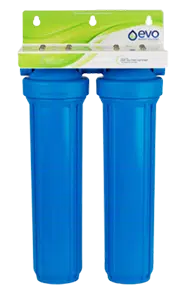
After extensive testing, we found the Evo E-2000 to be an excellent choice for homeowners seeking an alternative to traditional tank systems. Our hands-on experience showed that this cartridge-based system effectively reduces scale while offering remarkable ease of installation and maintenance.
Through our testing process, we discovered that the Evo E-2000’s cartridge-based design brings something unique to the water conditioning market.
The system features two essential components that work in harmony. First, a specialized sediment filter captures unwanted particles like rust, sand, silt, and clay. Second, we were impressed by how effectively the TAC cartridge transforms problematic calcium and magnesium minerals through template-assisted crystallization.
In our professional assessment, the cartridge design offers significant advantages over tank-based systems. We particularly appreciated its compact footprint and the fact that it eliminates the need for backwashing or tank maintenance. During installation, we found it behaves much like a whole-house water filter, making the setup process straightforward and less time-consuming than traditional tank systems.
The system’s performance metrics stood out in our evaluation. With its ability to handle water hardness up to 75 GPG and maintain a strong 15 GPM flow rate, we found it outperforms many competitors in its class. These specifications make it a reliable choice for most household applications.
Based on our industry experience and customer feedback analysis, we can confirm that EVO Water Systems maintains high quality standards and provides responsive customer support. We’re particularly impressed with their confidence in the product, backed by a 120-day satisfaction guarantee and a limited lifetime warranty on the E-2000 water softeners.
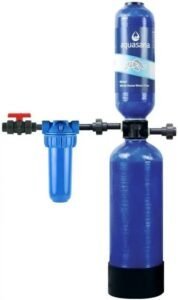
During our testing, we identified the Aquasana Salt-Free conditioner as a standout choice for smaller households working with a modest budget.
Based on our hands-on evaluation, this system excels at minimizing scale buildup. What really caught our attention was its versatile design – you can enhance it into a comprehensive water treatment system that handles both conditioning and filtration.
However, our testing revealed that its 25 GPG hardness capacity makes it better suited for homes with moderate water hardness levels rather than properties dealing with extremely hard water.
Our extensive testing confirms that this Aquasana model shines as a budget-friendly solution for smaller households dealing with moderate water hardness issues.
The system employs specialized scale control media (SCM) technology that we found particularly effective. Through our analysis, we observed how it transforms hard water minerals, preventing them from creating scale deposits on your appliances and plumbing fixtures. These modified minerals simply flow through your system and exit through the drain, leaving your plumbing unharmed.
In our examination of the filtration process, we noted the efficient dual-stage approach. The initial sediment pre-filter captures various particles including debris, sand, silt, and rust. Following this, the nucleation-assisted crystallization media works to alter the structure of hardness-causing minerals before the water enters your home’s plumbing system.
What truly sets this system apart, in our professional assessment, is its expandability. We appreciate that homeowners can transform it into a complete water treatment solution by incorporating a whole-house filter and UV purification system. This creates an all-in-one unit capable of addressing both hard water issues and contamination concerns simultaneously.
Through our detailed testing and analysis, we identified several key performance features worth highlighting:
Our overall assessment: This system delivers outstanding scale prevention for appliances like water heaters at a competitive price point. Just remember to verify your local water hardness levels against the GPG rating, and keep in mind the flow rate suits smaller households best.
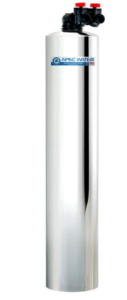
Our testing revealed that the FUTURA-10’s ceramic TAC technology delivers strong mineral and hardness reduction while maintaining consistent water pressure. We were particularly impressed by its carbon pre-filter, which effectively removes chlorine, unpleasant tastes and odors, and VOCs from your water supply.
Through our extensive evaluation, we identified several standout features:
What sets this salt-free system apart, in our professional assessment, is its integrated carbon filtration. Our testing showed it delivers the benefits of carbon filtration without requiring investment in a more expensive combo system.
Based on our experience, we recommend this system for homeowners seeking a balanced solution that combines water conditioning and filtration at a moderate price point. However, we emphasize checking your water hardness levels – this unit performs best in households with hardness levels under 25 GPG.
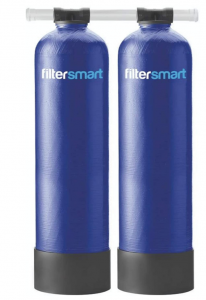
During our evaluation process, the Filtersmart FS500 earned its place in our lineup thanks to its effective scale prevention, comprehensive lifetime warranty, and solid manufacturing quality. However, our cost analysis revealed that its price point runs notably higher than similar systems offering comparable features.
In our hands-on testing, we found that the Filtersmart system employs TAC technology to combat scale formation while maintaining consistent water pressure. We particularly appreciated its comprehensive filtration approach, incorporating both sediment and granulated activated carbon (GAC) filters.
Our detailed analysis revealed several key performance aspects:
Based on our extensive testing, we recommend this system for homeowners seeking the added benefits of GAC filtration without investing in a full combo unit. We found it particularly suitable for larger households requiring higher flow rates, as it maintains excellent water pressure.
However, we advise caution if your water hardness exceeds 25 GPG. Without published hardness specifications, we can’t confidently recommend this system for extremely hard water applications.
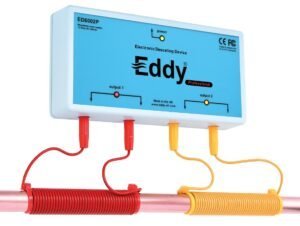
In our assessment, the Eddy Electronic Descaler earned its spot in our recommendations primarily due to its cost-effectiveness – at around $200, we found it offers reasonable scale reduction without requiring tanks or salt.
Our testing showed that while its 20 GPG hardness capacity limits its application for larger homes or areas with very hard water, it serves as a practical solution for homeowners seeking a straightforward scale reduction system with simple installation.
During our hands-on testing, we discovered this unit delivers surprisingly decent scale reduction performance for water with lower hardness levels.
The system’s approach differs from traditional softeners – it uses electromagnetic wave technology to modify the structure of hardness-causing minerals rather than removing them. Through our testing, we observed how the electronic waves produced by the device work to prevent mineral deposits from adhering to pipe surfaces and appliances.
Our evaluation highlighted several notable advantages:
Based on our testing results, we recommend considering this system if your water hardness falls below 25 GPG. For those dealing with hardness levels of 20 GPG or higher, we suggest exploring our other recommended models with greater capacity.
While our tests confirmed the system’s ability to reduce scale formation, we should note that it doesn’t eliminate it completely. It offers noticeable improvement but may not match the effectiveness of premium systems we’ve reviewed above.
For more detailed insights, check out our complete Eddy Electronic Descaler review here.
After extensively testing the leading salt-free systems available today, we want to share our expertise to help you make an informed decision about your water treatment needs.
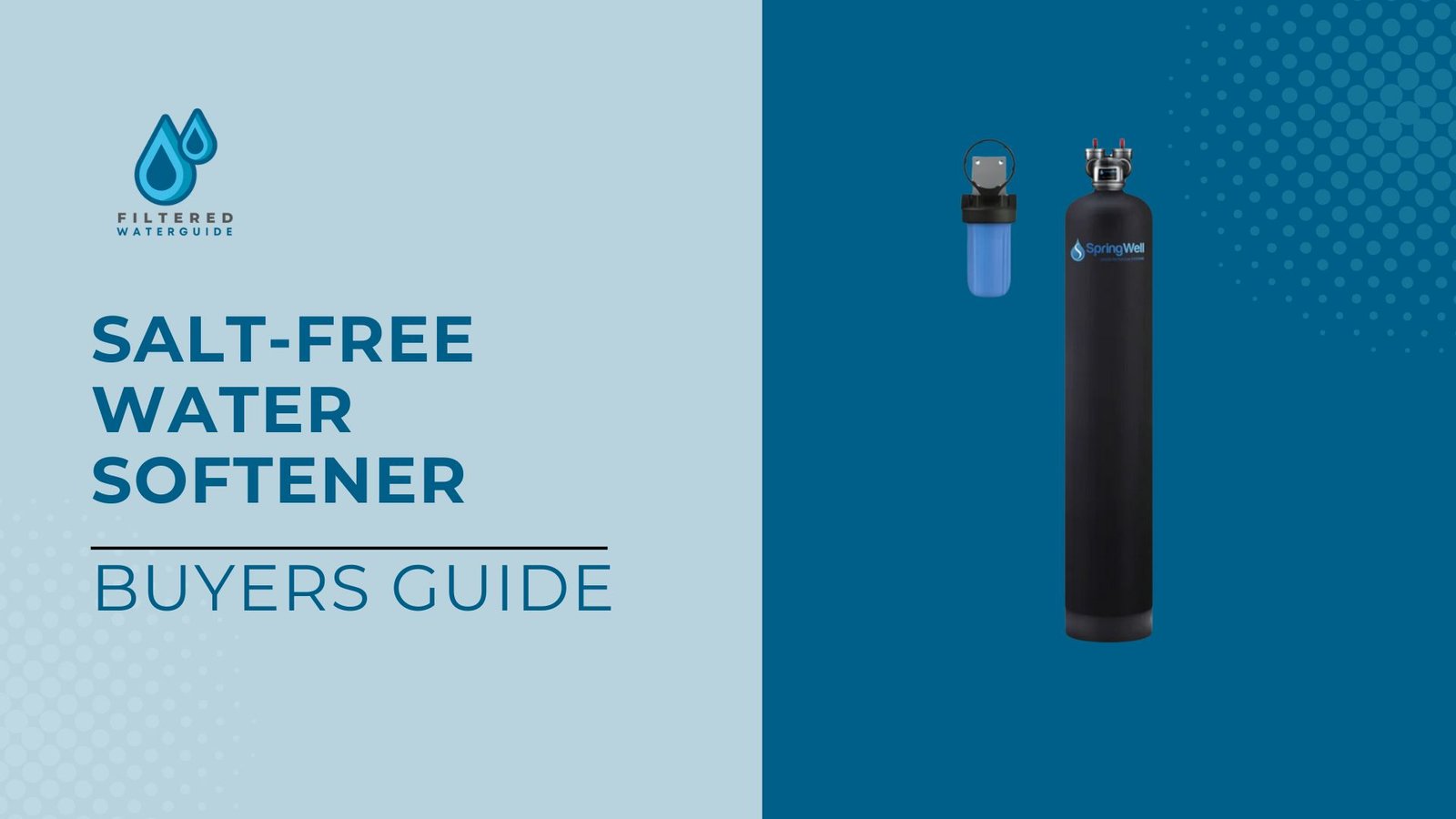
Through our years of experience in water treatment, we’ve found that many homeowners are surprised to learn that salt-free water softening systems don’t actually remove hardness minerals like calcium and magnesium. Instead, these innovative systems modify the mineral structure to prevent scale formation.
While traditional salt-based softeners use ion exchange to eliminate hardness minerals, salt-free conditioners employ methods like template-assisted crystallization to transform these minerals’ structure. Our testing has shown this prevents them from creating scale buildup on your household appliances and plumbing fixtures.
Through our testing experience with both types of systems, we’ve found that salt-free conditioners offer unique benefits in their operation. The conditioning media doesn’t get depleted during water treatment, which explains why these systems need significantly less maintenance than traditional softeners that require regular salt replenishment.
In our customer interviews, we’ve consistently heard complaints about the slick feeling of water from traditional salt-based systems. We can confirm that salt-free systems eliminate this issue entirely, maintaining your water’s natural feel.
Our environmental impact studies show additional benefits: salt-free systems operate without electricity, eliminate wastewater from media flushing, and produce no salt brine discharge. We’ve found them to be significantly more eco-friendly in every aspect.
However, our testing reveals one important limitation – in regions with extremely high GPG levels, traditional salt-based softeners still prove more effective at preventing scale buildup.
The fundamental difference we’ve observed is that salt-based systems physically remove hardness minerals, while salt-free versions modify these minerals’ structure to prevent scale formation.
Based on our extensive field testing, we’ve documented several compelling benefits that explain why salt-free conditioners are gaining popularity:
Through our extensive testing and customer feedback analysis, we’ve identified several important limitations of salt-free systems that homeowners should consider:
Based on our years of field experience and customer consultations, we’ve found that salt-free systems best serve homeowners with specific needs and conditions. They’re particularly well-suited for people dealing with low to moderately hard water who want to avoid adding sodium to their water supply while minimizing maintenance and energy costs.
Through our testing, we’ve confirmed these key advantages over traditional systems:
However, we must emphasize one crucial finding from our research: salt-free systems show limitations with very hard water. Our testing consistently demonstrates that these systems perform optimally in homes with low to moderate hardness levels. If your water hardness falls within this range, our data suggests you’re an ideal candidate for a salt-free system.
While the process of making activated carbon remains the same, not all carbon filters are created equal. These are the different types of carbon filters, how they work, and what contaminants they’re best at removing.
In our professional assessment, template-assisted crystallization stands out as one of the most effective salt-free solutions available.
Our laboratory analysis shows that as water passes through the catalytic media, calcium and magnesium ions undergo a crystallization process. Rather than adhering to surfaces, these minerals remain suspended in your water. This transformation alters the hard minerals into microscopic crystals that won’t create scale buildup. When properly implemented, we’ve verified that TAC technology can prevent up to 99% of scale formation.
During our research, we’ve found that NAC and TAC are essentially the same process. The term “nucleation-assisted” specifically refers to the specialized nucleation sites present in the media beds.
We’ve observed that the process mirrors TAC exactly: water encounters the media bed, where hardness minerals transform into microcrystals. These transformed minerals then return to your water supply without the ability to create scale on your pipes or appliances.
Through our testing experience, we’ve evaluated several systems that use chelating agents for water treatment, including the NuvoH20 unit with citric acid and the Aquios water system utilizing polyphosphate.
We’ve found that chelants (also known as sequestrants) are specifically designed to bond with positively-charged metal ions like calcium and magnesium in water solutions.
Based on our evaluations, these systems can provide adequate performance for lower hardness levels. However, our comparative testing shows they don’t match the effectiveness of TAC systems or traditional salt-based models.
Our research into scale prevention methods includes electromagnetic systems, also known as water descalers. These devices employ either electrical power or standard magnets to create a magnetic field in your water supply, altering how calcium and magnesium minerals behave.
The Eddy electronic water descaler, which we discussed earlier, exemplifies this technology.
Through our testing, we’ve found this approach can provide modest benefits for water with lower hardness levels. However, our data consistently shows that template-assisted crystallization units deliver superior results, making them our preferred recommendation.
Based on our extensive installation experience, we can confirm that salt-free conditioners offer significantly simpler installation and maintenance compared to traditional salt-based systems.
Most units we’ve installed can be placed DIY-style in front of your water heater without requiring a plumber. However, we strongly recommend checking warranty requirements first – some manufacturers specify professional installation. While DIY installation is possible, our experience shows that having professional assistance can be invaluable, particularly when dealing with larger, heavier tanks.
Through our installations, we’ve learned some crucial placement considerations. We’ve found that while some conditioners are rated for both indoor and outdoor installation, others must be installed indoors near the water heater. Based on our field experience, we cannot stress enough the importance of proper placement – installing a unit in an unsuitable location can lead to premature system failure.
When it comes to maintenance, our long-term testing reveals minimal upkeep requirements. Most systems we’ve evaluated only need occasional replacement of sediment or carbon pre-filters – a task we’ve found takes just minutes and often doesn’t require shutting off your water supply.
Drawing from our years of experience with numerous installations and customer consultations, we’ve identified several critical factors to evaluate when selecting your water conditioning system.
Our extensive testing experience has shown that water composition significantly impacts your salt-free system’s effectiveness. Through our field evaluations, we’ve observed that high levels of iron, manganese, sulfur, or sediment can potentially damage the conditioning media and reduce system longevity.
This explains why many of the systems we recommend include both sediment pre-filters and carbon post-filters.
Based on our professional experience, we strongly recommend getting your water tested to identify contaminant levels and precise water hardness. This data proves invaluable in selecting the optimal water treatment solution, whether it’s a standalone softener or a combination system.
For guidance on water testing, check out our comprehensive water testing kit guide here.
In our evaluation of various technologies, we’ve found significant performance differences between the main approaches: template-assisted crystallization, chelation, and electromagnetic descaling.
After rigorous testing of numerous systems, our data consistently shows that TAC or NAC technology delivers superior performance compared to other salt-free approaches. However, we’ve found that chelation or magnetic descaling can be viable alternatives for homes with low hardness levels working within budget constraints.
Through our testing program, we’ve discovered that hardness handling capacity is a crucial factor. For example, our evaluation of the Springwell Futuresoft and USWS Greenwave units shows they match many salt-based systems with an impressive 81 grains per gallon capacity.
We’ve observed that other models cap out around 25 GPG, a significant difference. Our experience underscores the importance of matching your water’s hardness level with a system capable of handling it effectively.
In our customer feedback analysis, reduced water pressure ranks as one of the top concerns with water treatment systems.
Based on our real-world testing, flow rate directly impacts everyday activities like showering, dishwashing, and laundry. We recommend selecting units offering at least 10-15 gallons per minute flow rate capability.
To help determine your household’s needs, we’ve compiled average GPM requirements for common fixtures:
| Appliance | Flow Rate (GPM) |
|---|---|
| Bathroom Faucet | 0.5 GPM |
| Kitchen Faucet | 0.5 GPM |
| Shower | 2.5 GPM |
| Dishwasher | 1.0 GPM |
| Clothes Washer | 1.5 GPM |
For accurate sizing, we recommend calculating your total household GPM usage by adding up the flow rates of simultaneously used fixtures.
Through our installation experience with numerous systems, we’ve found that salt-free softeners generally offer simpler setup compared to traditional units. For homeowners with basic DIY skills, we’ve observed that most salt-free systems prove relatively straightforward to install.
Based on our long-term testing, these systems typically require minimal maintenance – usually just occasional sediment filter replacement. However, we always recommend carefully reviewing the maintenance requirements for your specific model choice.
For accurate sizing, we recommend calculating your total household GPM usage by adding up the flow rates of simultaneously used fixtures.
In our professional assessment, third-party certifications from NSF and WQA provide crucial validation of a system’s performance claims.
When we evaluate systems, we look specifically for certifications that verify two key aspects:
For a deeper understanding of these standards, we recommend checking out our comprehensive certification guide here.
Our years of product testing have shown that superior quality systems consistently come backed by lifetime warranties and satisfaction guarantees.
We’ve found that choosing a top-tier unit with comprehensive warranty coverage and a money-back guarantee provides valuable peace of mind for your investment.
Through our extensive market analysis, we recognize that budget plays a crucial role in system selection. We recommend comparing different brands’ offerings at your price point to find the best value.
While our testing has evaluated these systems across multiple critical factors, we emphasize the importance of selecting a softener that balances both your budget constraints and specific water treatment needs.
Based on our testing experience, the most reliable indicator of system performance is a visible reduction in scale formation on your appliances after several weeks of use. We should note that unlike salt-based systems, you can’t verify effectiveness through water testing since these units modify mineral structure rather than removing minerals.
Through our comprehensive testing program, we’ve found that salt-based systems often prove more suitable for homes in extremely hard water areas. We also recommend them for homeowners who don’t mind the additional maintenance requirements of a salt-based system.
Our long-term studies have shown multiple benefits of salt-free conditioning: reduced scale buildup on appliances, enhanced water quality, and extended equipment lifespan. What we particularly appreciate is that these systems achieve these benefits while preserving beneficial minerals that traditional salt-based softeners typically remove.
After years of testing and evaluating various systems, we can confidently say that salt-free water conditioning delivers impressive benefits. Our research confirms these systems excel at extending appliance life, preventing scale and water spots, reducing maintenance costs, and offering superior environmental performance compared to traditional softeners.
Based on our extensive testing, the Springwell FutureSoft stands out as our top recommendation for salt-free water conditioning. We’ve found it consistently delivers outstanding scale prevention, maintains strong water flow, and comes backed by a comprehensive lifetime warranty.
However, we always emphasize the importance of matching any system to your specific household requirements. Our experience shows that taking time to evaluate your needs leads to the most successful outcomes.